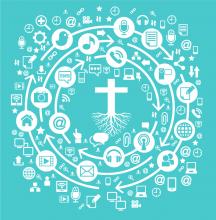Internet

A tech writer’s obituary for PCWorld’s print magazine — part tongue-in-cheek, part nostalgia riff — reminded me that I once devoured that magazine, now kaput.
It was an early lens into the fascinating world of personal computing. Its ads and articles stoked dreams of power and speed.
I soon became part of PCWorld’s dilemma. I dropped the print mag and began seeking tech news on the Internet. It was faster and fresher, had clickable links to other sites, great art, and brevity. PCWorld itself went online.
Much of my world has switched to the Internet. I do most of my banking and bill paying online, shop online, order lunch online, learn choir music online, teach classes online, use email and text messaging extensively, and read the news online.
Nothing unusual in any of that. Such web-centered behavior has become the new normal. Any enterprise that isn’t considering ways to move its operations online is losing its future.
In my world, more and more churches are going web. Electronic newsletters replace mailed paper. Clergy use email to communicate, as do staff and volunteers. Tweets, Facebook posts, e-blasts, and text messages carry word of emergencies. Constituents make donations online.
There’s more. Classes are moving online, as are interviews with job candidates and opinion surveys. Some congregations are experimenting with worship online and small groups. Every Sunday morning, some 600,000 people a minute access Bible verses online using one app.

On Slate, Emily Bazelon laments her colleagues’ lack of outrage at the revelations of the National Security Agency’s vacuuming up of data on what all of us are doing. In the New York Times, Ross Douthat explains it in terms of an internet motto: “abandon all privacy, ye who enter here.”
Privacy is soooo 20th century, no?
Yes. We now live in a world where we are constantly making choices that trade our privacy for convenience, from Easy Pass to global positioning to, of course, all the on-line services and commerce that we indulge in. No wonder the collective yawn at news that the federal government is doing what we assume Google is doing, in the (presumed) interest of public safety.

When it comes to mass communication, Christians do some things well and some things horribly. Here’s a breakdown:
1) The Best
Public Speaking:
Christians have been publicly speaking for thousands of years — since Old Testament times. Church culture is inundated with motivational and inspirational presentations, sermons, illustrations, speeches, and teachings. Sunday schools, youth groups, small groups, church services, camps, retreats, and conventions all have a variety of public speakers.
Christians were experts at the art of speaking before TED Talks became popular or business presentations were commonplace. People working in full-time ministry often speak in front of groups at least two or three times a week — sometimes more. They can sense when audiences are engaged or bored and have the ability to whip stadium crowds into an emotional and spiritual frenzy.

“Be still and know that I am God.” - Psalm 46:10a
From April 29 to May 5 individuals, households, and communities will celebrate Screen-Free Week by disconnecting from their screens — TV, computers, games, mobile devices — during their free time and reconnecting with relatives, neighbors, the natural world, and the quiet voices that may be drowned out by the constant barrage of electronic noise. My neighborhood celebrated early so we could offer a variety of cost-free and screen-free family activities during the school's spring break week. I organized the celebration, as I've done for the last six years. It was satisfying to see kids slow down and engage in gardening, carpentry, music making, nature exploration …
I also observed Screen-Free Week myself. Seven days of fasting from electronic media showed me how much time I spend using then mindlessly and forced me to confront my idolatries that are fed or masked by this mindless use. I'm using Michael Schut's definition of idolatry:
"An idol is anything we put before God, a partial truth mistaken for the whole Truth, a lesser good elevated to the ultimate good. … Idols [promise] what they cannot deliver."

The seven deadly sins have new partners in crime.
Lust, gluttony, greed, sloth, wrath, envy, and pride still attract a lot of attention. But as the Internet and other media invade American life, our vices have also gone virtual, according to a new study.
Nearly half of Americans say they are tempted to idle the hours away on the Internet, video games and television, according to Barna Group, a California-based Christian research organization.
1) Tune in. Log off. Let go.
Darting fireflies supplied most of the light that pierced the rural darkness when I arrived at the Wild Goose Festival site on a farm in Shakori Hills, N.C., late last Wednesday night. I left my ballast — a huge duffel bag containing a pup tent and enough bug spray to cover a small village, a suitcase full of mostly tie-dyed clothing, a large computer case and a camera bag — in the 15-person van that had spirited me from the Raleigh-Durham airport to the farm about an hour away.
While I’m not exactly known for packing light when I travel, my unusually cumbersome luggage for the festival contained the various gadgets and gizmos that would allow me to work from my campsite on the farm — live blogging about the festival, complete with video, audio and photos, and the help of four Sojourners interns who were set to arrive Thursday afternoon.
I had barely stepped foot on the campground when I checked my smart phone to see if cell service and the festival’s WiFi were working. They were. Good, I thought. All set to work. It would be a hectic few days covering the festival’s numerous speakers and musical performances, but we’d get it done.
Ah, hubris. Humans make plans. God chuckles and says, “Oh, really?”
The Almighty, it would seem, had better ideas for how I should spend my time at Wild Goose, which takes its name from the Celtic metaphor for the Holy Spirit.

Religious groups have long vied for prime parcels of land, planting churches on town squares and monasteries amid isolated mountains. But now they’re targeting real estate in a less tangible sphere: cyberspace.
For the first time in its history, the international nonprofit that doles out generic Internet domain names such as “.com” and “.edu” will allow more specific web address extensions like “.church.”
Hundreds of companies, Internet entrepreneurs and cities submitted nearly 2,000 applications, seeking the right to own everything from .app to .zulu, the Britain-based International Corporation for Assigned Names and Numbers announced last on June 14.

“There is no distance in the Spirit.”
After 30 years as a believer, I experienced the truth of that statement — powerfully and indelibly — in an unlikely place: online.
Like so many of more than 500 million (and growing) members, I signed up for Facebook, the social networking site, a few years ago out of pure curiosity -- to check in with old friends, boyfriends and former colleagues from a safe distance. With its plethora of personal photos, videos and regular “status updates” from members, it was a voyeuristic paradise, not to mention an excellent place to kill time.
I am by vocation a journalist, author and blogger and had grown accustomed to sharing glimpses of my life in print and online. Facebook was just another venue to do that, but little more.
That is, until early one morning in April 2008 when I signed on to my account, wiping sleep from my eyes with coffee in hand, and noticed the status update of a friend from college: “David is really sad that Mark died today.”

A Mormon student surfs the Internet for a school assignment and discovers that Mormon founder Joseph Smith had multiple wives, even marrying a 14 year old.
A returned Mormon missionary, preparing a Sunday school lesson, comes across a website alleging that the Book of Mormon was plagiarized from a novel.
Surprised by what they find so easily online, more and more Mormons are encountering crises of faith. Some even leave the fold and, feeling betrayed, join the ranks of Mormon opponents.
It's a growing problem, acknowledges Marlin Jensen, the outgoing historian for the Church of Jesus Christ of Latter-day Saints, and it's one Mormon leaders are working to confront.
"Never before have we had this information age, with social networking and bloggers publishing unvetted points of view," Jensen said. "The church is concerned about misinformation and distorted information, but we are doing better and trying harder to get our story told in an accurate way."
The church "has made no effort to hide or obscure its history," Jensen said, but some aspects — such as polygamy — "haven't been emphasized often because they were not necessarily germane to what is taught at present."
Can the LDS church do better to explain its history, even to its own members? Sure, Jensen said.

In his message for the 2012 celebration of World Communications Day, Pope Benedict XVI praised the benefits of social media, while also cautioning against its dangers.

You’re on the Internet right now.
Maybe you’re on your phone, or your iPad, or even your desktop at work (it's OK, your secret's safe with us). No matter what your choice of access media, if you’re reading this, you’re on the Internet.
Most of us take Internet access for granted. (Who can remember life before Google?) A seemingly endless, free-to-all source of information, knowledge and distraction, the Internet drives and facilitates transactions both inconsequential and global, simple and complex.
Certainly the Internet has a seedy underbelly, from spammers and basement-dwelling sport hackers to illicit businesses and toxic enterprises.
But who polices it? Who’s the Internet Sheriff?
 #OccupyWallStreet (the New York-based protest against social and economic inequality, corporate greed, and the influence of corporate money and lobbyists on government) has moved to a new location, a street where the air is far sweeter than on Wall Street.
#OccupyWallStreet (the New York-based protest against social and economic inequality, corporate greed, and the influence of corporate money and lobbyists on government) has moved to a new location, a street where the air is far sweeter than on Wall Street.
Won't you tell me how to get, how to get ... there?
That's right, folks, the occupation has taken over Sesame Street.
 "The man who can articulate the movements of his inner life," the late Christian apologist and author Henri Nouwen said, "need no longer be a victim of himself, but is able slowly and consistently to remove the obstacles that prevent the spirit from entering."
"The man who can articulate the movements of his inner life," the late Christian apologist and author Henri Nouwen said, "need no longer be a victim of himself, but is able slowly and consistently to remove the obstacles that prevent the spirit from entering."
Throughout the ages, how Christian believers have chosen to articulate their inner lives has had many manifestations in literature, music, architecture, and other artistic endeavors.
As a means of communicating and wrestling with his inner life -- his journey of faith -- Greg Fromholz, an American expatriate youth worker for the Church of Ireland in Dublin, wrote a book titled Liberate Eden, but traditional publishing houses found that his work was a bit too iconoclastic for their tastes.
"It is just too different to be Christian," one publisher pronounced.
We're sorely missing the servant leadership of America's CEOs on matters of corporate taxation.
As Congress contemplates trillions in budget cuts that will worsen poverty and undermine the quality of life in America, consider these findings from a new report that I co-authored, "Massive CEO Rewards for Tax Dodging," by the Institute for Policy Studies.
Last year, the compensation of 25 CEOs at major profitable U.S. companies was larger than the entire amount their company paid in U.S. corporate taxes.
These 25 include the CEOs of Verizon, Boeing, Honeywell, General Electric, International Paper, Prudential, eBay, Bank of New York Mellon, Ford, Motorola, Qwest Communications, Dow Chemical, and Stanley Black and Decker.
The avalanche of information available via the Internet is both a blessing and a curse. Used judiciously, it is an invaluable tool for research -- making what used to take hours in a library now just a few clicks away. Any piece of information, no matter how obscure, is at our fingertips.
The proliferation of blogs and listservs mean an amount of information that is simply impossible to keep up with. We have news summaries several times a day and instant breaking news headlines as they happen. And then there is the rise of a new social media. Facebook has enabled us to connect with friends and family, so we know immediately the latest cute thing their toddler did, what they're cooking for dinner, and the most recent book they read. On Twitter, we share thoughts and activities in 140-word tweets.
All of this means we know more than ever, but never have time to think about it. Neal Gabler, a senior fellow at the Annenberg Norman Lear Center at the University of Southern California, lamented in a piece in The New York Times Sunday Review: